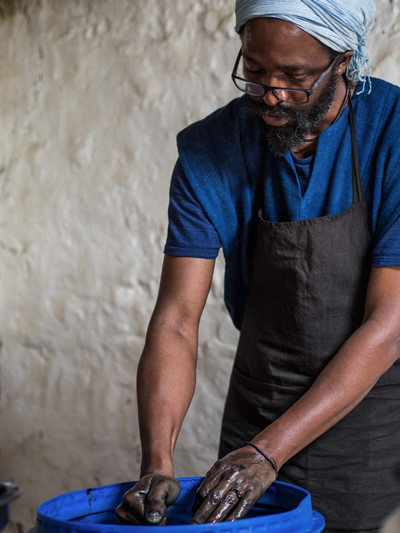|
This issue of the newsletter features news of the first of an ongoing series of residential workshops we will be offering. At the Threads of Life Dye Studio in the Bebali Dye Garden we will be offering encounters with Indonesia's indigenous textile and natural dye arts, which are among the world's greatest surviving traditions. Participants will explore their creative potential and expand their fiber arts practice, learning hands-on skills from expert practitioners of Indonesia's textile and fiber traditions. A focus will be on learning traditional natural dye practices from master dyers using plants direct from the dye garden, and gaining insights from the cultures expressed through the archipelago's textile and fiber arts from Threads of Life's field staff.
The dye studio and garden are on the grounds of the Umajati Retreat where our residential program is based. Multi-day to multiple-week programs will offer a combination of natural dye, weaving, batik, and ikat skills, as well as offering exposure to and immersion in the cultural values of ecological responsibility expressed through Indonesia's textile traditions. Natural dye processes take time and while waiting for dyes to be ready, there are a range of opportunities for developing processing skills in the studio. Expert studio teachers will be available to impart initial skills, and then to support ongoing development of participants' abilities and creative projects.
As an inaugural program we are offering two workshops with Malian master indigo dyer, Aboubakar Fofana, in February and March 2017. The dialogue between the traditions and cosmologies of Mali and Bali as expressed through the work of Aboubakar and the Threads of Life studio dye staff will be the unique aspect of this opportunity.
|
|
A 12-day indigo fermentation workshop with Aboubakar Fofana
27th February to 10th March 2017
 Aboubakar Fofana describes an indigo vat as "a living organism" of plant materials, fermentation and colour, and is recognised as one of the world's foremost practitioners of fermented indigo vat dyeing and mineral mud-dye techniques. Aboubakar Fofana describes an indigo vat as "a living organism" of plant materials, fermentation and colour, and is recognised as one of the world's foremost practitioners of fermented indigo vat dyeing and mineral mud-dye techniques.
This intensive 12-day workshop focusses on Aboubakar's speciality, the fermented West African indigo dye-vat, made using the whole indigo leaves and fermented over a week to produce a dye of unmatchable colour and fastness. Whilst participants wait for the fermented dye-vat to reach maturity, they will learn other dye processes, including powdered fructose (quick vat) indigo, mineral mud-dye, and a host of other colours from madder, cochineal, weld, walnut, catechu (cutch) and oak gall, offering a comprehensive introduction to dyeing with natural dyes for beginners and further insight for those seeking to extend their repertoire and techniques.
The schedule runs over two weeks with a weekend break in the middle to give time for the indigo vat to ferment and for participants to explore the culture of Bali. Participants will come away from the workshop with: a professional-level introduction to the skills of dyeing across the three major natural dye categories of vat dyes (indigo), additive dyes (mordanted dyes such as cochineal and madder) and substantive dyes; several sets of dyed samples; and a larger completed personal project that should showcase many of the dyes and the techniques studied in the course.

A 4-day fructose vat indigo workshop with Aboubakar Fofana
13th to 16th March 2017

Indigo is Aboubakar Fofana's particular passion and he has a vast store of knowledge on its provenance, usage, and practical applications. This 4-day workshop focusses on the use of powdered indigo and setting up a fructose vat using entirely non-synthetic and environmentally (and skin!) friendly techniques.
The workshop explains the chemistry of indigo, principles of setting up and caring for a fructose vat, as well as choice and preparation of the textiles to be dyed. Participants will also experience the difference between powdered and fresh indigo during a day spent preparing indigo direct from the Threads of Life dye garden with the studio's resident dyers. A fermented indigo vat that Aboubakar will have been preparing over the previous two weeks will also be available.
Participants attain enough knowledge to set up their own vats and start working with indigo, as well as a deeper understanding of how indigo works and how to achieve the best colourfast, light-fast and even results with this ancient and singular dye-stuff. Each participant will dye and take home a set of samples, and work on a larger project of their own with Aboubakar's assistance.

|
|
| |
| |
|
Best wishes,
W
illiam, Jean and everyone
at Threads of Life and the Bebali Foundation
|
|
|
|
From our social feeds to yours:
|
|
Colorways of Indonesian Cloth
We have created these images, Pantone Colors of Indonesian Cloth, as a little bit of inspiration for designers out there. Gorgeous color combinations!
|
|
Indigo Inspiration from #aboubakarfofana
Straight from Master dyer, textile designer, calligrapher and teacher Aboubakar Fofana's Instagram feed.
"This is a bit further along in the process of unravelling
and discarding the weft threads. You can see clearly in this picture that I am left just with warp threads.This needs to be done very gently so that the warp threads don't break."
"A finished piece in rice-flour resist, dyed in indigo, made by one of the participants in the ten-day intensive. Fabric that has been resisted in this way needs to be handled very gently and the gestures used for dyeing in the indigo vat are different."
|
|
Umajati Retreat
"Quiet paradise near Ubud."
--TripAdvisor, 2016
Winner of TripAdvisor's Certificate of Excellence 2016
Surrounded by tranquil rice fields, Umajati is a lush garden property hosting two elegantly converted 100-year-old Javanese teak wooden homes that provide 21st century living in 19th century houses.
Umajati is just 10 minutes north of Ubud and offers daily, weekly or monthly rentals.
1-bedroom house: USD 190 p/night
2-bedroom house: USD 245 p/night
|
|